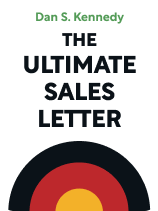

This article is an excerpt from the Shortform book guide to "The Ultimate Sales Letter" by Dan S. Kennedy. Shortform has the world's best summaries and analyses of books you should be reading.
Like this article? Sign up for a free trial here.
When you’re trying to sell your product, should you be completely transparent about the price? Is it okay to use techniques that some regard as manipulative?
The Ultimate Sales Letter provides time-tested foundational strategies in the art of persuasive writing that translate across media in the ever-evolving world of sales and marketing. Author Dan Kennedy leans into strategies that some would label as trickery or bullying to get people to respond to a sales letter.
Read more to learn his approach and alternative views of honesty in marketing, and determine for yourself whether you have to choose between being ethical and being effective.
Kennedy’s Approach
Dan Kennedy says you must address the tricky subject of your product’s price. You have to navigate this carefully because consumers won’t buy a product without knowing its price, but they’ll also forgo purchasing that product if they don’t like its price. He recommends two strategies to de-emphasize your product’s cost and turn customers’ focus to reasons they should buy it.
The first strategy is to shift the conversation from your product’s price to the value or savings your customer will experience when they buy it. But, the second strategy pushes the conversion further—and, some would say, too far, crossing the line when it comes to honesty in marketing.
Kennedy advises that you move beyond the topic of price by focusing on persuasion techniques that compel your customer to buy your product:
- Say that:
- You’re about to run out of your product.
- Smart people are buying your product (implication: If the consumer doesn’t buy it they’re not smart).
- Only special people understand the value of your product or have been selected to try it—and not everyone ticks these boxes.
- Paint a harrowing picture of a problem your target customer faces, provide an example that will trigger an emotional reaction in them, then say how your product will solve it.
Repeatedly offer product guarantees (money back, refunds, free trials) or make them the central focus of your sales pitch.
Which Is the Stronger Approach: Manipulation or Transparency?
Kennedy argues that, while consumers may react negatively to strategies that trick or bully them into responding to your sales letter, the benefits often outweigh the costs. But some sales experts counter that a low-pressure sales approach is more ethical and effective, allowing you to build relationships and maintain your reputation with customers. Let’s look at two ways that price can be addressed:
Strategies that could be considered manipulative but are often effective:
- Contrast your product with more expensive versions to make yours look more affordable.
- Reduce the font size of prices and remove dollar signs.
Break the full price of your product into a smaller dollar amount, then turn that amount into a tangible item that customers waste money on (for example: “You can save a baby for less than the price of a cup of coffee”).
By contrast, if you have an established client base and need to announce a price increase on your product, here is what a transparent strategy could look like:
- Make sure that everyone in your business knows about the price increase before announcing it to customers.
- Inform customers of the price change well before its implementation.
- Reassure customers that higher prices mean better quality.
- Explain the reasoning for the price increase.
- Encourage customers to reach out with questions or concerns.
Honesty in marketing extends beyond price. Being upfront about problems with your product is perhaps more important now than ever. The risk of disgruntled customers publicly airing complaints about your flawed product—and of millions of people hearing them—has grown since Kennedy published the 4th Edition of The Ultimate Sales Letter in 2011. Some marketing strategists recommend that you openly display problems with your product to get ahead of online trolls by featuring your product’s flaws front and center in your content headline and on your website, or by joking about and making light of its problems in your advertising.

———End of Preview———
Like what you just read? Read the rest of the world's best book summary and analysis of Dan S. Kennedy's "The Ultimate Sales Letter" at Shortform.
Here's what you'll find in our full The Ultimate Sales Letter summary:
- How to craft powerful sales letters that will capture attention
- Time-tested foundational strategies in the art of persuasive writing
- Why you don't need a college degree to be a successful copywriter






